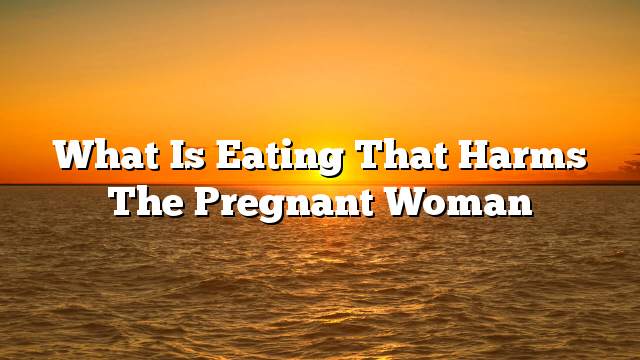Pregnancy
The mother should start caring for her health and nutrition – once pregnant – that will be reflected in fetal health and development during pregnancy. Changing lifestyle, eating healthy foods and abstaining from harmful foods and drinks are some of the most important actions to be taken during pregnancy.
Healthy diet during pregnancy
Fresh, low-processed foods, such as whole grains, lean meats, fruits and vegetables, pulses and low-fat dairy, are the basis for building a full and integrated diet for the pregnant mother and ensuring fetal growth and access to all its nutrients.
Foods to avoid during pregnancy
In pregnancy, and with changes in the body of the woman, the strength of the immune system is reduced and the body becomes more susceptible to diseases and infections, so avoid foods that may be contaminated or contain microbes, including:
- Raw or poorly cooked animal products: This type of product may contain various microorganisms, such as bacteria, viruses and fungi, and cause infections. Therefore, the pregnant woman must cook meat and other animal products before taking them.
- Avoid eating raw eggs. It may contain salmonella bacteria, which lead to diarrhea, vomiting and high fever, while eggs can be eaten after cooking. Cooking temperature ensures the elimination of any germs and bacteria.
- Avoid meat, meat, and unprocessed dairy products. These foods may contain bacteria that cause Listeriosis, which can lead to miscarriage, pregnancy, lack of delivery, and other health problems.
- Some fish and seafood, long-lived fish often contain a higher proportion of mercury than other fish, and mercury may negatively affect the normal growth of the fetal brain and nervous system. Fish caught from streams, rivers and ponds may contain harmful elements In the nervous system of the fetus as a result of its impact on water pollution common in many areas.
- Raw sprouts, bacteria may reside inside the seeds of buds and impossible to get out with washing, so it is recommended to avoid eating fresh, but can be taken after it is cooked well.
- Not eating too many foods rich in vitamin A, taking 10,000 units or more of vitamin A may lead to congenital deformities in the fetus, and liver is one of the most important sources of vitamin A, so avoid avoidance of excessive intake, especially in the early months of pregnancy, Attention to the lack of any dietary supplements containing high amounts of vitamin A or even liver oil is also rich in vitamin A.
Drinks should be avoided during pregnancy
Some drinks are harmful to the mother and fetus during pregnancy, and it is recommended to avoid or reduce them, and these drinks:
- Alcohol and spirits of all kinds. Alcohol reduces oxygen and nutrients to fetal cells and hinders its growth and development. According to the Centers for Disease Control and Prevention, there is no safe amount of alcohol to drink during pregnancy.
- Juices and unpasteurized milk sold on the sides of roads or farms. These drinks may contain microbes and germs and endanger the health of the mother and fetus.
- Water contaminated with lead, especially in old houses, contains lead water pipes, where lead can leak from the pipes to drinking water, leading to many complications, such as the birth of a baby with little weight, premature birth, or delayed development of the fetus.
- Caffeinated beverages, such as coffee, tea, soft drinks and energy drinks, increase the risk of miscarriage, pregnancy, lack of birth, or reduced fetal weight. Therefore, it is recommended to reduce caffeine intake to less than 200 mg per day.
Herbs should be avoided during pregnancy
Although herbal products and herbs are considered safe products for human health and can be taken without harm, eating herbal products may be harmful during pregnancy, and often there is no evidence that they are safe for the mother and fetus during pregnancy. Studies to confirm the safety of herbal products during pregnancy, so it is best to avoid taking these products during pregnancy, although it is advisable to consult with the doctor following the situation in this matter.
As for drinking herbal drinks, the pregnant woman can drink them as an alternative to drinks containing caffeine, but moderation in drinking and not to multiply it is desirable.
Of the herbs that are preferred during pregnancy are those containing stimulants, or dietary supplements that contain caffeine, especially those that are used to promote weight loss.
Calories consumed during pregnancy
In pregnancy, some women think they should eat twice the normal amount of food, being responsible for feeding two people at this time, but this is not true. Eating large amounts of food and calories will lead to obesity and weight gain, affect the health of the mother and put the child at risk of obesity. later.
It is most appropriate for a mother to increase the calories consumed in prenatal conditions by 340 calories during the second trimester and 450 during the third trimester, but if the mother is overweight or obese she can consume less calories , And at the same time to remember that pregnancy is not the appropriate period for weight loss or the work of diet.
